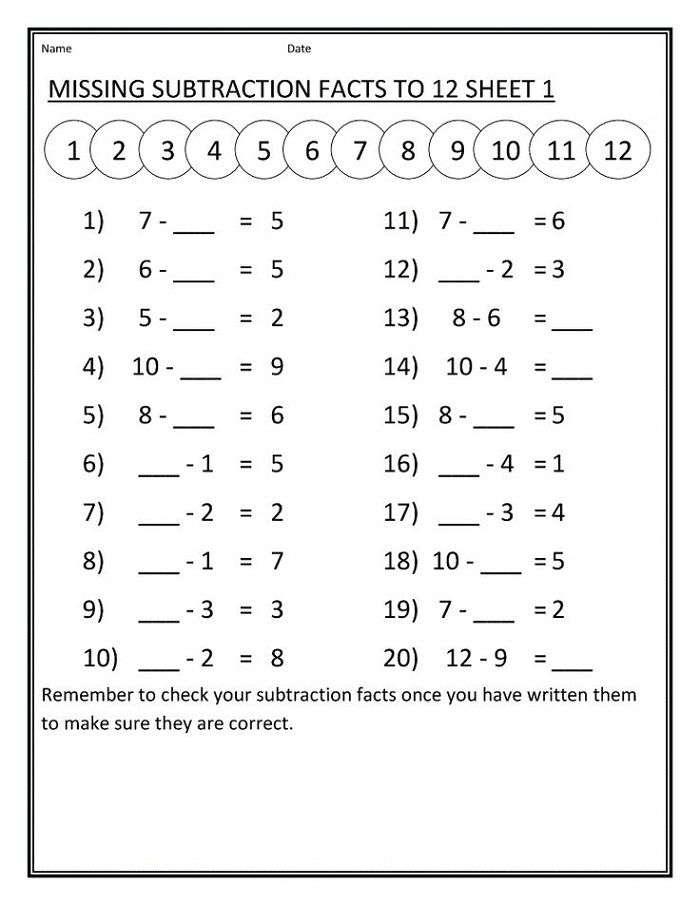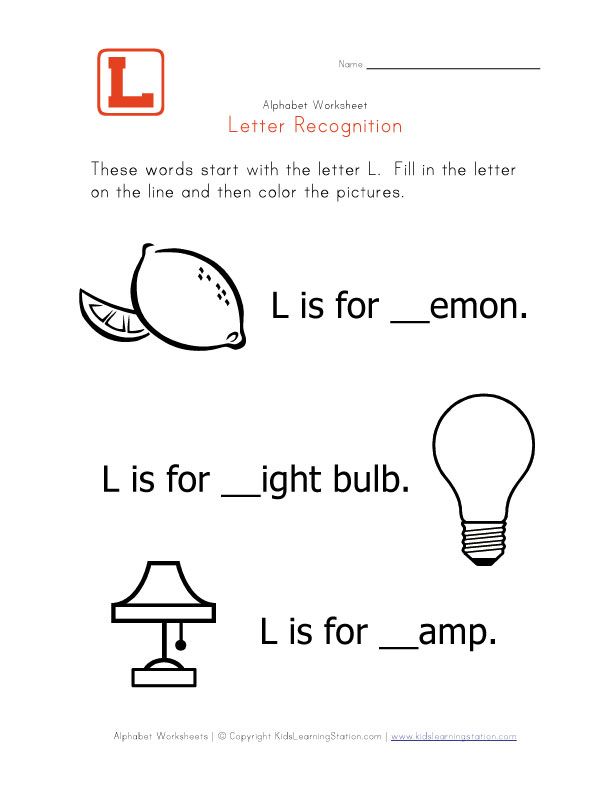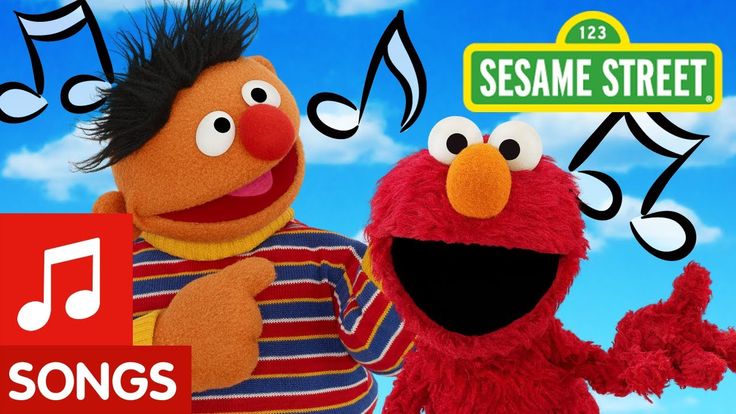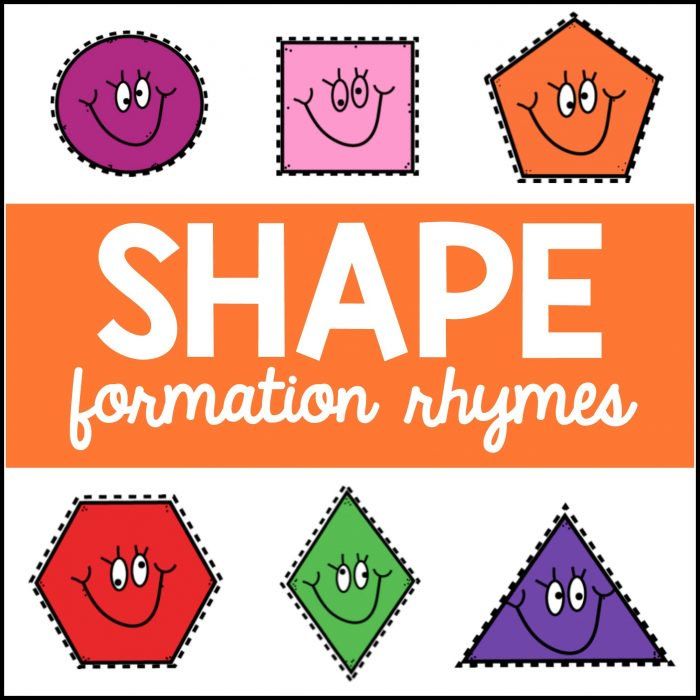Spelling rule for double consonants
Doubling the final consonant before adding –ed or –ing
Ask the Editor
Question
When do you double the consonant at the end of a verb, before adding –ed or –ing? — Pasam G, Tanzania
Answer
SPELLING RULES FOR VERBS WITH -ING AND -ED ENDINGS
When a verb ends in a consonant, sometimes the consonant is doubled before adding the –ed or –ing ending, like this:
stop --> stopped, stopping
- Lucy stopped the car.
- Why was Lucy stopping the car?
And sometimes the final consonant is not doubled, like this:
shift --> shifted, shifting
- Sandy shifted the gears.
- Sandy was shifting the gears too much.
To know when to double the final consonant, follow the rules below.
RULES
- In a word with 1 syllable, double the final consonant ONLY if the word ends in 1 vowel + 1 consonant.
- In a word with 2 or more syllables, double the final consonant ONLY if the word ends in 1 vowel + 1 consonant AND the final syllable is stressed.
- At the end of a word, don’t count w, x, or y as a consonant.
APPLYING THE RULES
These verbs get a doubled final consonant:
- tip / He tipped the waiter. /He isn't tipping the waiter.
- cram / The students crammed for the test. /The students were cramming for the test.
- regret / Carl regretted the things he had said. /Carl was regretting the things he had said.
These verbs do not get a doubled final consonant:
- vote --> voted, voting (vote ends in a vowel)
- instruct --> instructed, instructing (instruct ends in 2 consonants)
- listen --> listened, listening (listen has 2 syllables and the final syllable is not stressed)
Archive
Select month.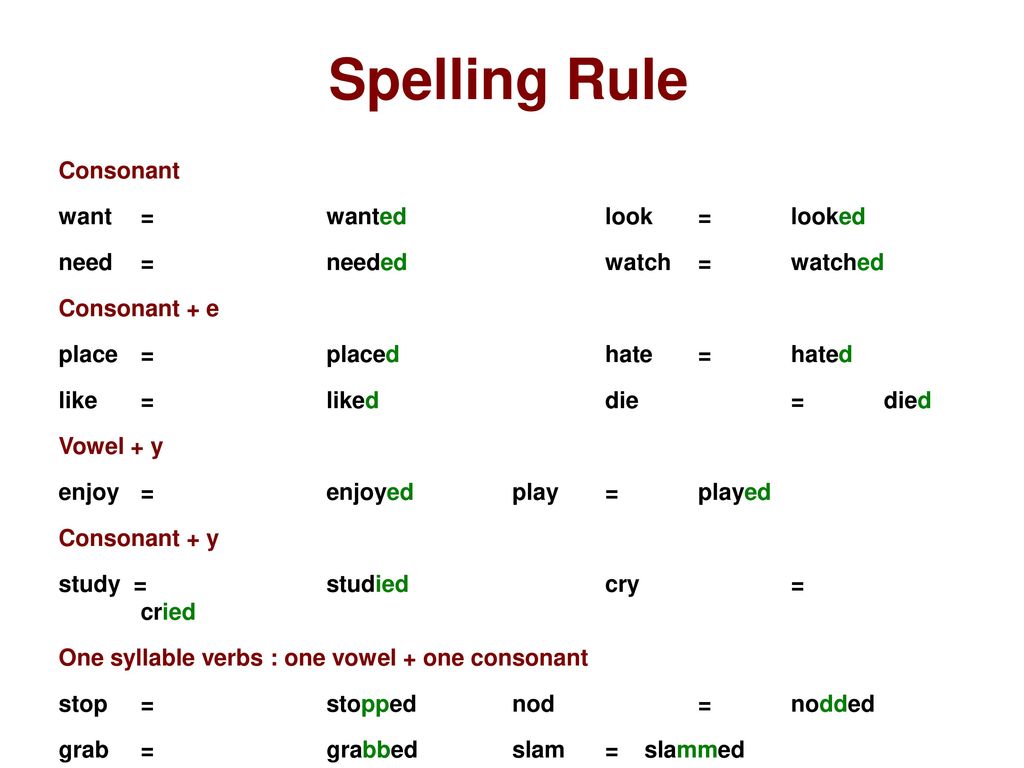 ..February 2022January 2022December 2021November 2021October 2021September 2021August 2021July 2021June 2021May 2021April 2021March 2021February 2021January 2021December 2020November 2020October 2020September 2020August 2020July 2020June 2020May 2020April 2020March 2020February 2020January 2020December 2019November 2019October 2019September 2019August 2019May 2019April 2019March 2019February 2019January 2019December 2018November 2018October 2018September 2018August 2018July 2018June 2018May 2018April 2018March 2018February 2018January 2018December 2017November 2017October 2017September 2017August 2017July 2017June 2017May 2017April 2017March 2017February 2017January 2017December 2016November 2016October 2016September 2016August 2016July 2016June 2016May 2016April 2016March 2016February 2016January 2016December 2015November 2015October 2015September 2015August 2015July 2015June 2015May 2015April 2015March 2015February 2015January 2015December 2014November 2014October 2014September 2014August 2014July 2014June 2014May 2014April 2014March 2014February 2014January 2014December 2013November 2013October 2013September 2013August 2013July 2013June 2013May 2013April 2013March 2013February 2013January 2013December 2012November 2012October 2012September 2012August 2012July 2012June 2012May 2012April 2012March 2012February 2012January 2012December 2011November 2011October 2011September 2011August 2011July 2011June 2011May 2011April 2011March 2011February 2011January 2011December 2010November 2010October 2010September 2010August 2010July 2010June 2010May 2010April 2010March 2010February 2010January 2010December 2009November 2009October 2009September 2009August 2009July 2009June 2009May 2009April 2009March 2009February 2009January 2009December 2008November 2008October 2008September 2008
..February 2022January 2022December 2021November 2021October 2021September 2021August 2021July 2021June 2021May 2021April 2021March 2021February 2021January 2021December 2020November 2020October 2020September 2020August 2020July 2020June 2020May 2020April 2020March 2020February 2020January 2020December 2019November 2019October 2019September 2019August 2019May 2019April 2019March 2019February 2019January 2019December 2018November 2018October 2018September 2018August 2018July 2018June 2018May 2018April 2018March 2018February 2018January 2018December 2017November 2017October 2017September 2017August 2017July 2017June 2017May 2017April 2017March 2017February 2017January 2017December 2016November 2016October 2016September 2016August 2016July 2016June 2016May 2016April 2016March 2016February 2016January 2016December 2015November 2015October 2015September 2015August 2015July 2015June 2015May 2015April 2015March 2015February 2015January 2015December 2014November 2014October 2014September 2014August 2014July 2014June 2014May 2014April 2014March 2014February 2014January 2014December 2013November 2013October 2013September 2013August 2013July 2013June 2013May 2013April 2013March 2013February 2013January 2013December 2012November 2012October 2012September 2012August 2012July 2012June 2012May 2012April 2012March 2012February 2012January 2012December 2011November 2011October 2011September 2011August 2011July 2011June 2011May 2011April 2011March 2011February 2011January 2011December 2010November 2010October 2010September 2010August 2010July 2010June 2010May 2010April 2010March 2010February 2010January 2010December 2009November 2009October 2009September 2009August 2009July 2009June 2009May 2009April 2009March 2009February 2009January 2009December 2008November 2008October 2008September 2008
You can read more articles in the archive.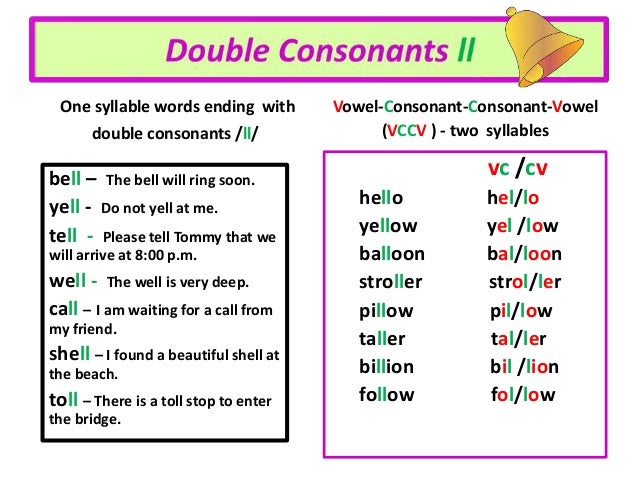
Spelling rules: doubling up
There are so many spelling rules and it can be difficult to remember them all when you are learning English (and even if you do remember the rule, sometimes it doesn’t always apply, for instance the ‘I before E rule’). However, the doubling rule, or the 1-1-1 rule works in every instance.
The spelling rule
The spelling rule is: if the word has 1 syllable (a word with one vowel sound), 1 vowel and it ends in 1 consonant, you double the final consonant before you add ‘ing’, ‘ed’, ‘er’, ‘est’ (also known as a suffixal vowel). You don’t double the consonant if the word ends in ‘tion’ (also known as a suffixal consonant).
So, if the word has:
- 1 syllable
- 1 vowel
- 1 consonant, which follows the vowel
You double up the last consonant, to make a suffixal vowel (running/ runner, jogging, stopping/stopped).
For example: The word ‘run’
- It has 1 syllable
- It has 1 vowel – ‘u’
- And it has 1 consonant that follows the vowel – ‘n’
In this instance, you double the last consonant to make the word ‘running’.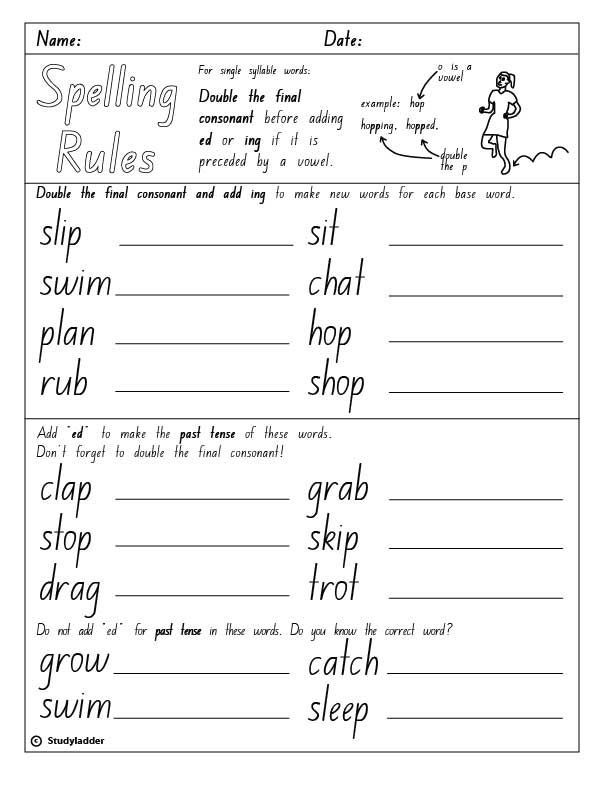
More examples:
- Run = Running
- Stop = Stopping/Stopped
- Big = Bigger
- Quiz = Quizzes
- Fat = Fatter/ Fattest
Words that have more than one consonant after the vowel don’t double, e.g. ‘lift’ has two consonants ‘f’ and ‘t’, so you don’t double the last consonant, instead you just add the suffixal vowel: ‘lifting’.
For words that have a long ‘e’ vowel on the end, for example grade, slide, hate, you drop the ‘e’ before adding ‘ing’ or ‘ed’, without doubling the last consonant. E.g. Grade becomes ‘grading’ or ‘graded’.
Words with more than one syllable
The doubling rule can also be used for words with more than one syllable, however these words must end in a single consonant and the primary stress must be on the final syllable.
So, if the word has:
- More than 1 syllable
- Ends in 1 consonant
- The final consonant follows a vowel, and that vowel is bearing primary stress
You double up the last consonant, to make a suffixal vowel.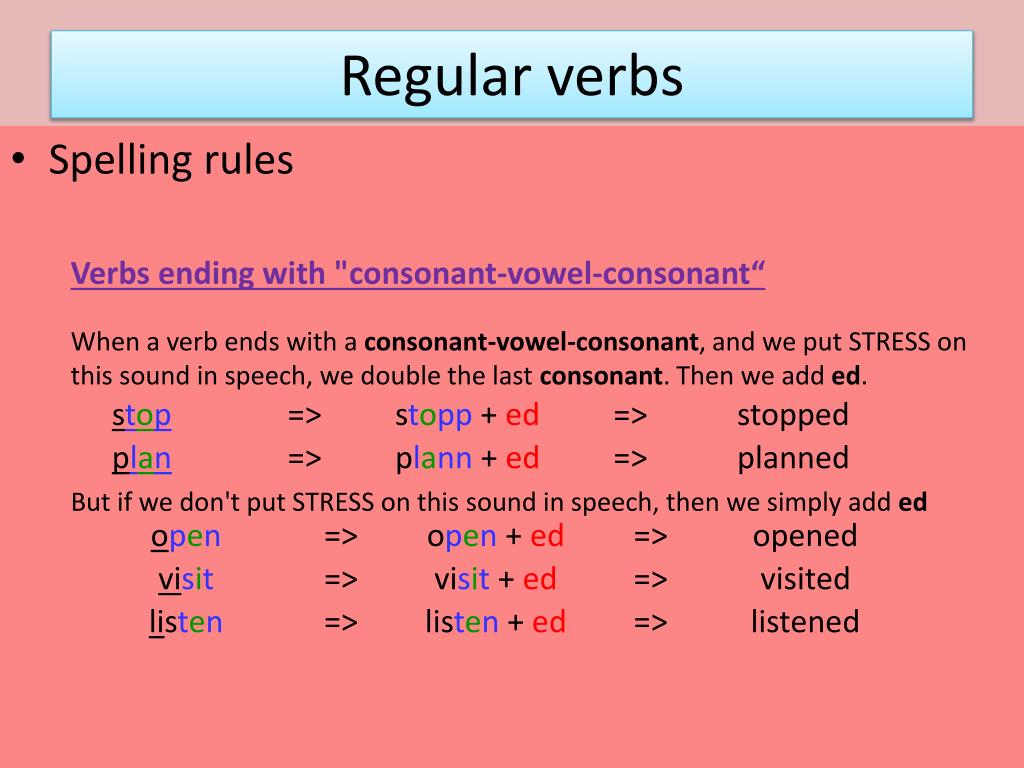 Just like with a single syllable word, you don’t double the last consonant for a suffixal consonant.
Just like with a single syllable word, you don’t double the last consonant for a suffixal consonant.
For example: The word ‘begin’
- It has more than 1 syllable (2 syallables – be-gin)
- It has 1 vowel that bears the primary stress – ‘i’
- And it has 1 consonant that follows the primary stress bearing vowel, in this instance – ‘n’
In this instance, you double the last consonant to make the word ‘beginning’.
More examples:
- Control = Controlling/Controlled
- Regret = Regretting/Regretted
However, if the primary stress is not on the last syllable then you do not double the consonant. E.g. ‘open’ becomes ‘opening’.
Double consonants in Russian and foreign words
Words with double consonants are quite common in Russian - they can be both borrowings and native Russian words. The double consonant is used not only at the root, but also at the junction of morphemes. There are certain spelling rules that govern the use of doubled consonants.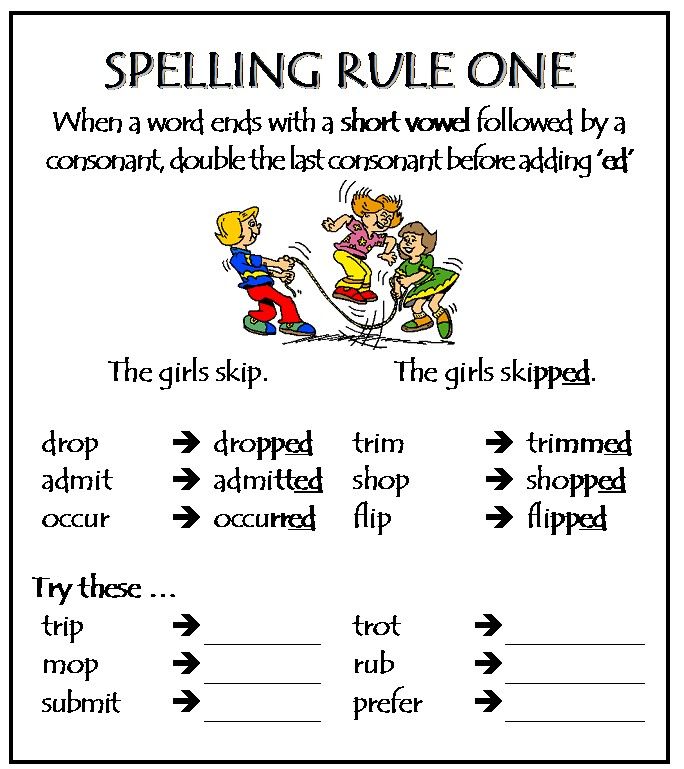
Content
- Double consonants in foreign words
- Doubling of consonants in Russian words
- Complex cases of consonant doubling
Double consonants in foreign words
In Russian spelling, doubling can be caused by various reasons.
- In many borrowed words, the spelling of the source language is preserved and we write double consonants in such cases according to tradition, for example: antenna, grammar, colossus . The spelling of double consonants in words of foreign origin is determined in dictionary order, for example: appeal, appendicitis, fiction, boss, hippo, dilemma, irrational, college, coefficient, pessimism, symmetry, chlorophyll, ellipse, essence, effect and others.
- However, with one consonant , the words are written: aluminum, attribute, bachelor, balustrade, volleyball, gallery, landing, dessert, amateur, Qatar, midget, privilege, producer, resources, sidewalk, etc.
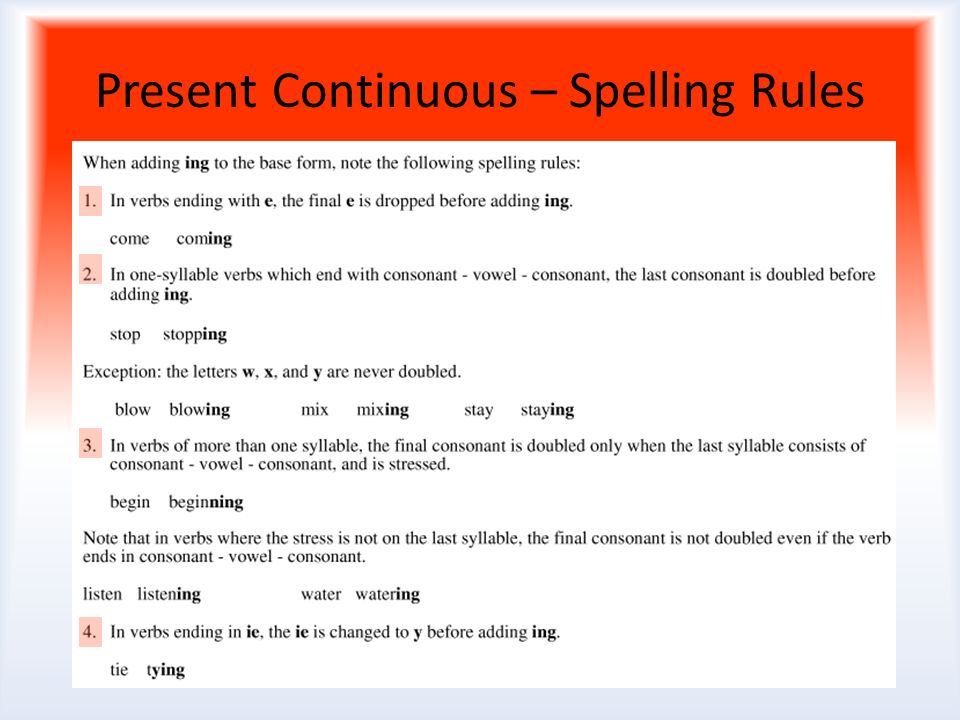
- In the suffix -ess - two are written with ( poetess, stewardess ), in the suffix -is- one with ( actress, director ).
- In words formed from stems ending in two identical consonants, double consonants before suffixes are usually preserved , for example: program - program, telegram - telegram, score - nine points, Gall - Gaulish . Wed: Cannes Film Festival, Bonn Government, Lausanne Conference , etc.
- But in a number of words, as well as in diminutive proper names of persons in this case, is written one consonant , for example:
a) operetta - operetta, column - column, ton - three-tone, Finn - Fink a (usually double n is contracted into one n before the suffix -k-), Finnish;
b) Anna - Anka, Kirill - Kirilka, Rimma - Rimka, Philip - Filipka, Emma - Emka .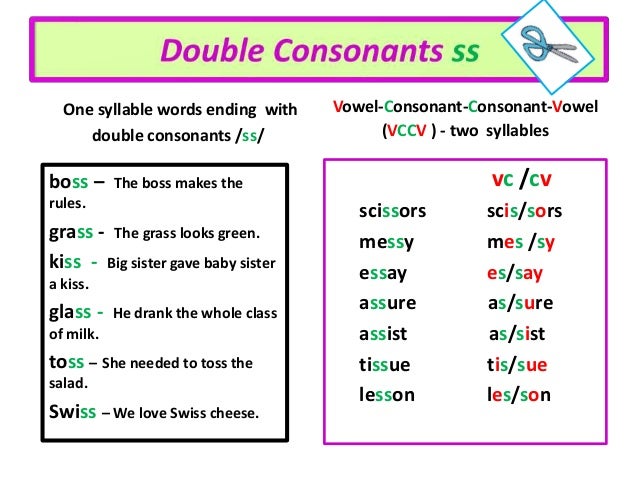
Doubling consonants in Russian words
1. Doubling of consonants is rare in the roots of Russian words. So, SS is written in the word quarrel , LiveJournal - in words yeast, buzz, juniper and in related related words: , buzzing, juniper and others , as well as in the word burning .
2. Double F is written in words and forms derived from the verb burn (burn) by alternating: burn, burn, burn etc. Compare: ignite - ignited, ignite .
When alternating zg / zzh, zd / zzh it is written ZZh, not ZhZh (contrary to pronunciation), for example: squeal - squeal, arrival - come .
3. Spelling Н and НН in different parts of speech.
4. In other cases, the doubling of consonants occurs at the junction of the prefix and the root (for example, tell ), root and suffix ( foggy ), and then the spelling of words obeys the morphological principle: we keep the same spelling of each of the morphemes.
In other cases, the doubling of consonants occurs at the junction of the prefix and the root (for example, tell ), root and suffix ( foggy ), and then the spelling of words obeys the morphological principle: we keep the same spelling of each of the morphemes.
Therefore, you should carefully analyze the composition of the word if the prefix ends and the root begins with the same consonant, for example: appeal, support, dawn . Compare: to give in - to give in. The door gave way under blows (has ceased to remain in its original position). - The door succumbed to the blows of the crowbar (did not hold back the pressure, pressure).
5. Double consonants are written in abbreviated words if one part ends and the other begins with the same consonant, for example: chief physician (chief physician).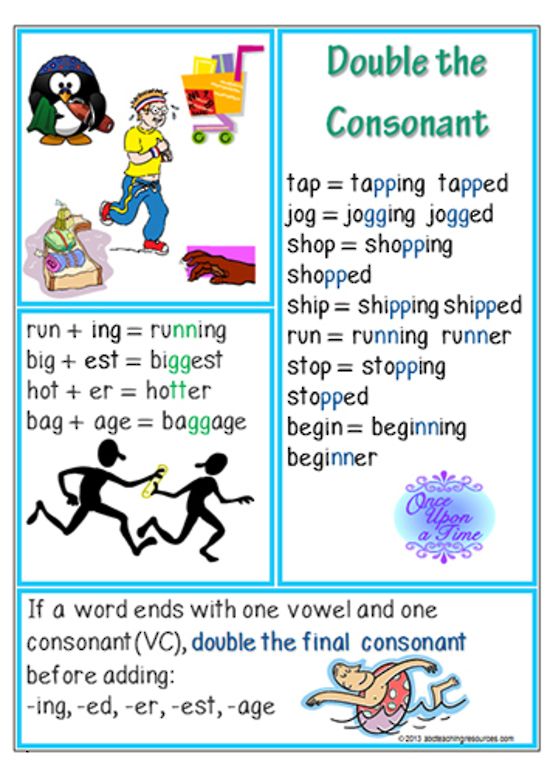
Note . In the first part of compound words, which is a stem that ends in a double consonant, only one consonant is written, for example: gramophone record, bureau .
PLEASE NOTE: Triple consonants are not written in Russian: ra ss yell (= ra s + ss yell).
Difficult cases of doubling consonants
At the same time, if he speaks of words that are formed by abbreviation, then if there is a double consonant in the first stem, it is cut off, as, for example, in the word gramophone record .
If a word with a diminutive meaning is formed from a word with double consonants, doubling is preserved: group - group and so on.
Also, double consonants before the suffix are usually preserved in other cases: compromise - compromise , although there are exceptions: crystal, but crystal .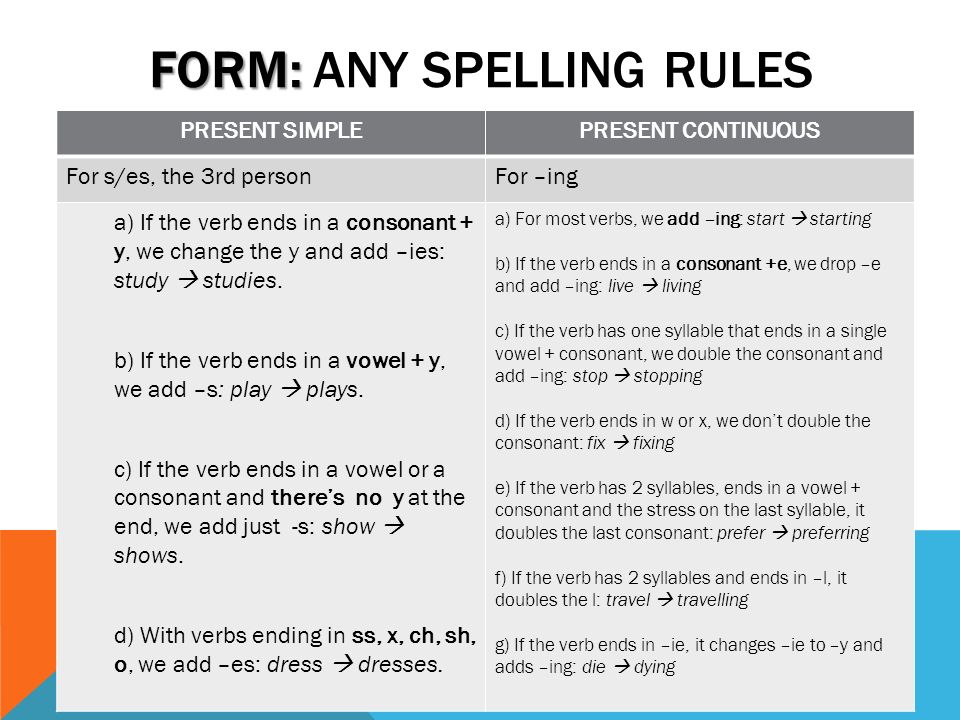
As for proper names with a double consonant, the diminutive nicknames formed from them are always written with one: Anna - Anka, Alla - Alka and so on.
Thus, there are quite a lot of words in Russian with a double consonant. These may also be native Russian words and borrowings, but it is the latter that account for the majority of such words. As for the lexemes of native Russians, if we talk about the root of the word, only two consonants can be doubled in them - this is s and zh.
Any consonant can be doubled in loanwords. There are no rules for checking the spelling of such words, they must be remembered.
Doubling of a consonant can also occur at the junction of morphemes - a root and a prefix or a root and a suffix. There are also suffixes with a double consonant. There are also some tricky cases of doubled letters that you should pay attention to.
Double consonants - spelling of words, rule (Grade 4, Russian)
4.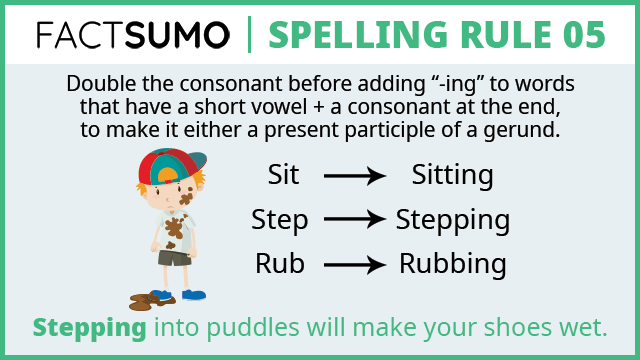 1
1
Average rating: 4.1
Total ratings received: 477.
4.1
Average rating: 4.1
Total ratings received: 477.
Words with double consonants are quite common in Russian - they can be both borrowings and native Russian words. The double consonant is used not only at the root, but also at the junction of morphemes. There are certain spelling rules that govern the use of doubled consonants. These rules are taught in 4th grade.
Double consonants in the roots of native Russian words
In such words, only two consonants can be doubled - these are s and zh, that is, in the root you can find only two combinations - ss and zhzh, while there are quite a few such words.
So, with doubles in the word quarrel and its derivatives, as well as in the names of the states of Russia and Belarus and those that originated from them.
Double w is used in words such as reins, yeast, juniper, buzz and words (word forms) that are formed from them.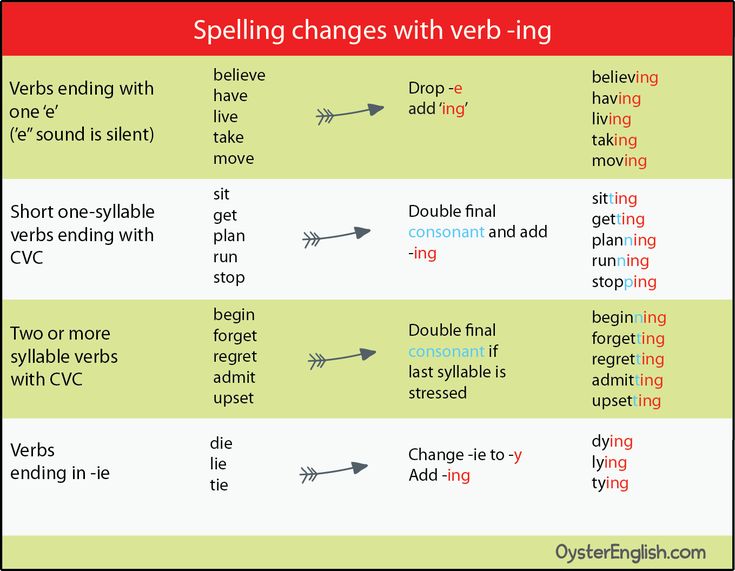
Despite the fact that the verb to burn is written with one j, in many words derived from it this letter is doubled - burning, burning, and so on.
Double consonants in the roots of loanwords
In such lexical units, double consonants are most common, and absolutely any letter can be doubled. In this case, it is impossible to pick up any rule, the spelling of such words will simply have to be remembered. Like other words with unchecked spellings, these are classified as dictionary words, meaning that if in doubt, the spelling can be checked in a dictionary. Certificate, ballad, illusion - all these are borrowed words in which consonants were doubled initially.
Doubled consonants at the junction of morphemes
Such cases in Russian are not uncommon - for example, when the prefix ends with a consonant, and the root begins with it, and these consonants are the same: bes+disputable=indisputable, etc.
Difficulties often arise in such cases. For example, if a word is formed from the root account, to which the prefix ras is added, then it is written with double s, but it is important not to confuse with words formed with the same prefix, but from a different root - even.
For example, if a word is formed from the root account, to which the prefix ras is added, then it is written with double s, but it is important not to confuse with words formed with the same prefix, but from a different root - even.
Also in Russian there are many suffixes with a doubled consonant, and doubling may occur at the junction of the root and the suffix. Here is an example of the latter case: sailor + ck - sailor .
Complex cases of consonant doubling
Moreover, if he speaks of words that are formed by the method of reduction, then if the first base has a double consonant, it is cut off, as, for example, in the word gramophone record.
If a word with a diminutive value is formed from a word with double consonants, the doubling is retained: group - group and so on. Also, double consonants before the suffix are usually preserved in other cases: compromise - compromise , although there are exceptions: crystal, but crystal .


